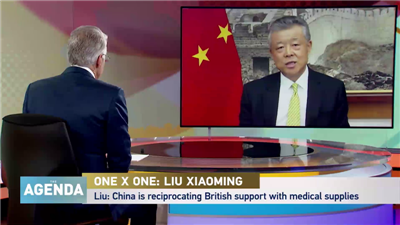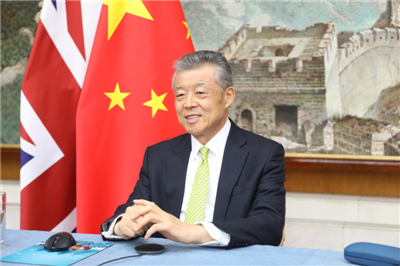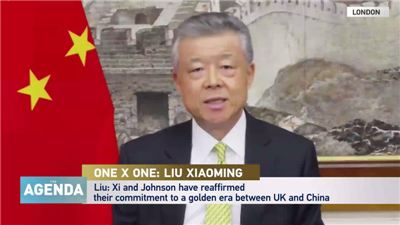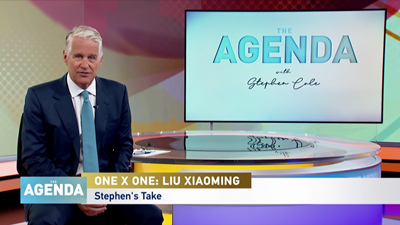|

On May 30, H.E. Ambassador Liu Xiaoming gave an online exclusive interview on CGTN's Agenda hosted by Stephen Cole, where he shared his views on China-UK Relations, China-US Relations, Hong Kong national security legislation, COVID-19 and its global impact, and China's foreign policy. The complete transcript is as follows.
Cole: Mr. Ambassador, welcome back to The Agenda. You've said you think China and the UK will emerge from these testing times with a more mature and a robust relationship. What did you mean by that?
Ambassador Liu: I mean this pandemic has brought our two countries closer. Since the outbreak, we have had very good cooperation in jointly fighting the virus. First of all, on the policy front, President Xi had two telephone conversations with Prime Minister Johnson. Both leaders reaffirmed their commitment to a stronger relationship between our two countries, and reaffirmed their commitment to a joint fight against the virus. They are committed to building the "Golden Era" between our two countries.
Secondly, on the ground, we have supported each other. At the height of this epidemic in China, the British side sent two shipments of medical supplies to Wuhan of Hubei province. Now, China is reciprocating the British support. We have provided most needed medical supplies, including ventilators.
Thirdly, the experts and scientists of our two countries are working on vaccine – our universities and businesses are working very closely.
Fourthly, health officials headed by Secretary Matt Hancock and Chinese Health Minister had a very productive webinar, joined by the scientists and medical doctors, to compare experience, compare notes on control and prevention, and also compare experience on lifting lockdown.
Fifthly, our two countries work together in the international arena. Both countries are supporting strongly the WHO in playing a leading role in the global fight against the virus. So I think China and the UK are partners in terms of building a global response to the virus. I think this virus brings our two countries together. So that's what I'm saying now. I believe relationship will emerge stronger from this battle against virus and cooperation between our two countries will be wider. And friendship between our two peoples will be deeper.
Cole: There are quite a few politicians, there are 20 MPs from the Henry Jackson think-tank, who are questioning this partnership. They say Britain may well have found out that it's too dependent on China for imports that are key to critical national infrastructure and the economy. That doesn't exactly promise a golden future of relations, does it?
Ambassador Liu: I noticed those politicians. And to be exact, there are 23 Conservative MPs and also some Labor MPs. They made some remarks, but I don't think they represent UK government's position. In my conversations with the Secretaries, Ministers, senior officials, they all told me, those people are speaking for themselves. These words, those MPs' remarks do not represent government position. Government position is exactly what I told you. They are committed to stronger relationship with China. They are committed to working together with China in this joint fight against this virus. And they do not represent the consensus, the broader consensus, here in the UK. I have many conversations with business people. I have had several webinars, with the CBBC, with the 48 Group Club, with the China Chamber of Commerce in the UK, and with the CBI. And I did another one, joined by a Minister of Trade. We compared notes with regard how to strengthen this partnership in this difficult time. And I think the broad consensus in the UK, from the government level down to the grassroots -- and I also have several conversations with the local governments as well – is that they are all calling for stronger relationship, calling for more robust cooperation between China and the UK.
Cole: Let's move on to the Two Sessions and the future of Hong Kong. Some Pro-democracy leaders in Hong Kong have suggested, are saying, that the proposed security law violates the spirit of Hong Kong's Basic Law that set out in "One Country, Two Systems". You will say that still exists. And in fact, the Premier was talking about that system still existing. But there are serious doubts about whether or not that "One country, two systems" does exist anymore.
Ambassador Liu: First, I should correct you if I may. I don't regard those people as so called pro-democracy leaders. They are anti-China elements. They are supporters for breaking away from China, supporters for separation, even for independence. When we talk about "One Country, Two Systems", first, we should recognize that this policy has achieved great success since Hong Kong's handover 23 years ago. In Hong Kong people enjoy unprecedented freedom and democracy. If you compare Hong Kong today with Hong Kong 23 years ago, everyone, even people with strong bias, should realize that Hong Kong people are much freer in terms of choosing their Chief Executive. Twenty-three years ago, who was electing the governor of Hong Kong? There was no democracy. There was no freedom to choose the leaders.
Cole: This is what some are saying in Hong Kong. There's no freedom left. Your parallel Ambassador, China's Ambassador to the UN, he has just blocked a UN Security Council meeting to discuss the legislation. China's Ambassador to the UN tweeted that Hong Kong is purely China's internal affair. Mike Pompeo in the States is saying Hong Kong is no longer autonomous. How do you react to all of those?
Ambassador Liu: Hong Kong is part of China. That's the problem with American politicians, UK politicians. They still regard Hong Kong as a place under British colonial rule. They still think Hong Kong is part of them. That's totally wrong. Hong Kong is part of China, just like California, Florida, they're part of the United States; like here, Scotland, Northern Ireland, Wales, they're part of the UK. So it is a central government responsibility to take care of national security. We've seen what happened last year. The violence. The riots. The terrorism. Any responsible government has to take measures to contain it, to stop this. So Hong Kong government -- I'm talking about Special Administrative Region government -- they are authorized to enact law according to Article 23 of the Basic Law to safeguard national security, to punish those who committed treason, terrorism, arson – there were seven categories of the violent crimes -- but failed. Hong Kong becomes a defenseless city. So the Central Government has to take the responsibility to address this situation.
Well, let's talk about "One Country, Two System". It's one complete concept. You can't separate the two parts: One country is the precondition. Without one country, there will be no two systems. So you have to realize Hong Kong is part of China. Then we made a commitment that Hong Kong people will enjoy high degree of autonomy, and Hong Kong people will run their affairs. But some people, especially in the Western world, are intentionally or unintentionally, ignoring "one country". They keep talking about "two systems". But these two are closely connected. If "one country" is undermined, there will be no prosperous "two systems". So that's very important. We just want to address this loophole in national security.
Many people here, because of the biased media, do not realize that without security and stability, there will be no prosperity in Hong Kong. The UK has 300,000 nationals living in Hong Kong and 700 businesses in Hong Kong. I think it's not only in the interest of China but also in the interest of the UK to have a stable, peaceful and prosperous situation in Hong Kong.
Cole: Indeed!
Ambassador Liu: If the situation as what we saw last year continues to carry on, can people enjoy a better life? Can people enjoy peaceful, stable life? The answer is no. So any responsible government will take measures to address this situation. It's timely, it's legal and it's reasonable.
Cole: Let's move on to the economy. The analysts reckon it'll take Britain at least three years to recover from the pandemic. At the Two Sessions, China decided not to set an economic growth target for the first time in a long time because of the uncertainty over COVID-19. How do you judge the global economic situation?

Ambassador Liu: You're worrying about the global situation, especially in the economic fronts. This pandemic really causes a very negative impact on the world trade, interflow of investment, even people traveling. And the difference from the impact of the 2008 financial crisis is that this pandemic causes a serious blow to the real economy. So it causes a downturn for trade, investment and the global growth. But now in China, we have achieved strategic success in containing the virus and we have started the resumption of production. I think China is now in a better place to move on. China used to be the engine and powerhouse of world economy, and we feel confident that China will continue to play that role. The reason we have this confidence is that, first, China itself is a factory. We used to call China the factory of the world. Now China will continue to play such a role. We see the economy suffer setbacks, but we should also realize that there are new opportunities emerging from this pandemic, such as online economy, cloud economy, especially the biological, medical industry. China now produces the most of the medical supplies. We have provided medical supplies to 150 countries. Second, China itself is still a big market.
Cole: It is a huge market. I apologize for interrupting you, Mr. Ambassador. Very briefly: You say China's a better place to move forward now. Does that give China an economic edge over the rest of the world?
Ambassador Liu: No, I can't say edge. We always believe in win-win cooperation. So that's why President Xi has been calling for building a community of shared future for mankind. When I say this pandemic brings China and the UK closer, it also brings the world closer. It really shows that we are all in this same global village, a small planet. We need to work together. So China would like to share not only our experience in containing virus, we would also like to share, as we did before, the opportunities of China's growth, China's development. And just like when it comes to China-UK relationship, we have started this "fast track" channel between our two countries. We want to facilitate people's travel, especially for the key workers. So the British businesses in China can restart as quickly as China's economy does.
Cole: A survey from Oxford University last week found that more than four out of ten people in Britain believe, to some extent, China created the virus as a bio-weapon to control the west. Now the rights and wrongs of that survey is another question, but it's a problem that a lot of people think like that, isn't it, in terms of reputation?
Ambassador Liu: I think it is totally wrong to accuse China of using this virus to control the world. China is a victim. China is not a culprit. China is not a producer of this virus. As a matter of fact, China is the country that first reported this virus to the World Health Organization, the first country to identify the pathogen, and the first country to share the genetic sequence with the WHO and the rest of the world. So that's why the rest of world, especially the scientists, medical doctors, can work on the vaccine and can work together to contain this virus. The National Medical Director for NHS England, Mr. Powis, puts it very directly: Because what China did at a very early stage, that gave us time to prepare and to work on the drugs, medicine and vaccine. It's totally wrong to criticize, to accuse China of reporting late or even creating this virus. I think this is due to some American politicians who try to politicize this issue, try to shirk their responsibility to contain the spread of the virus. As we said many times, this is not a time for playing the game of scapegoating, playing the game of blaming and playing the game of stigmatizing. It's a time to work together and to fight together against this virus.
Cole: You spoke about cooperation and you spoke at the CBI that you want cooperation, not confrontation, with the United States, but it takes two to tango. What do you mean by that?
Ambassador Liu: Because we want to have a good relationship with the United States. We always believe that China and the US will gain from cooperation and lose from confrontation. But this is our wish, our desire. You also need the United States to show the same willingness to work with us. If American politicians are blaming China every day, calling China names and try to scapegoat China for their own lack of response, there will be no good relationship. So that's why I'm saying, you need two to tango. You need to work together to build a stronger and good relationship.
Cole: Can China reach out? Is there any way China can offer some form of reconciliation, because this year started very well. There was a trade deal between the US and China. But now there seems to be very serious division. Some politicians are even talking about a "cold war". Does that worry you? And how can China reach out to the US if indeed it feels it should?

Ambassador Liu: We are reaching out to the United States for good relationship during this pandemic. We always believe that China and US have the same enemy, that is, the virus. We always send a message to the other side of the Atlantic -- in China it's the other side of the Pacific -- that China is not your enemy; your enemy is the virus. China, in fact, is your partner. We have provided billions of face masks. According to our foreign minister, every American has received on average 40 face masks imported from China. And also, many Chinese local governments, businesses, entrepreneurs, even schools and universities, and NGOs donate many medical supplies to different states in the US to help them fight this virus. I remember that Governor Cuomo of New York State spoke highly of China's contribution to help his state fight the virus. So, we want to work with the United States. We reached this trade agreement in good faith, and we told them that we're ready to implement this agreement. But it's also for the Americans to meet us halfway to work together for better relationship.
Cole: Some ambassadors have been reaching out around the world and the term "wolf warrior diplomacy" has been gaining some traction online. I don't know if you're one of the "wolf warriors", Mr. Ambassador, and if you could explain what "wolf warrior diplomacy" is and if they are all one of them.
Ambassador Liu: I don't think it's correct to characterize China diplomacy as "wolf warrior diplomacy". I think China's foreign policy remains the same. China is a peace loving country since ancient time. Our philosophy believes that harmony is a top priority. That's still our philosophy guiding our foreign policy, especially in modern time. President Xi proposed that we should build a community of shared future for mankind. That is our policy. You talk about the wolf warrior. The reason why there's a warrior fighting wolf is because there are wolves in this world. There're so many rumors, disinformation and fake news about China. Chinese diplomats need to stand up and speak out, to set the record straight, to tell people the true stories of China. So I do not regard myself as a wolf warrior. I regard myself as Chinese Ambassador in the UK building a stronger relationship between our two countries. But when there are rumors, some disinformation and fake news about China, I myself will and I also encourage my diplomats at the Embassy to speak out, to set the record straight.
Cole: OK. Last question, Mr. Ambassador. In an attempt to set the record straight, China says there will be a full investigation into the pandemic just as soon as this virus is over. But that could be a year. It could be a decade. When will that investigation start?
Ambassador Liu: I think it's very much up to the WHO. At the 73rd World Health Assembly, 120 countries sponsored a resolution. In this resolution all WHO members support the WHO to sponsor a review. It should be fair, independent, but it should be at an appropriate time. Now, the top priority is to fight the pandemic -- not only for the UK but also for China. We can't say we have claimed the final victory yet, because there are still sporadic cases. There are still some imported cases. So I quite agree that we have to be on alert. The UK government put forward a slogan "stay alert". We are also staying alert exactly in China. We have to make sure there will be no rebound of this virus, and there should be no second spike. I agree with the British Health Secretary when he said that "we should focus one hundred percent" on containing, on fighting, the virus now. So this is not the time to conduct the review. But China is open to, and supportive of, the international efforts to study the origin of the virus. The purpose is to get better prepared for the next outbreak of the virus. As President Xi said, we will eventually defeat the virus, yet this will not be the last time that mankind will be faced with a pandemic. So the purpose is to study, learn lessons and summarize experience. We should let the scientists lead this review, rather than politicians. It should not be politically motivated. It should not single out certain countries or be politicized. That is very important. This is our position.
Cole: Ambassador Liu, many thanks to you for joining us here on The Agenda again.
Ambassador Liu: Thank you.

|

